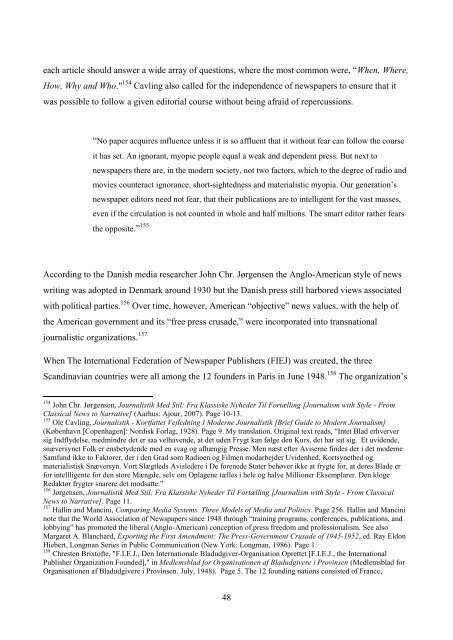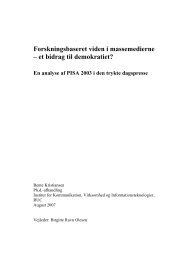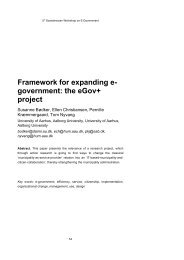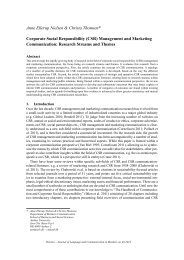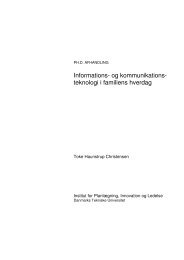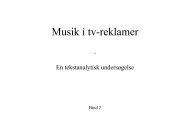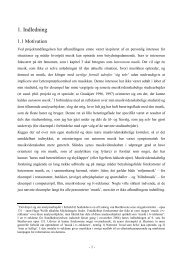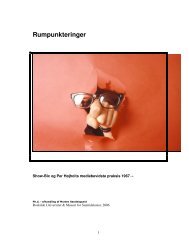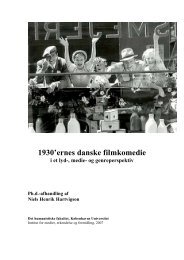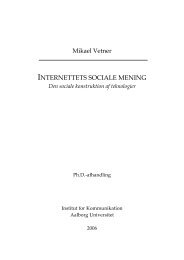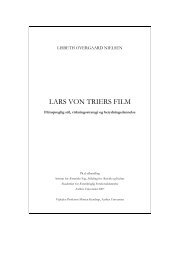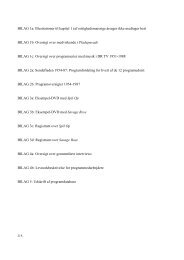The Jeremiad Over Journalism
The Jeremiad Over Journalism
The Jeremiad Over Journalism
You also want an ePaper? Increase the reach of your titles
YUMPU automatically turns print PDFs into web optimized ePapers that Google loves.
each article should answer a wide array of questions, where the most common were, ―When, Where,<br />
How, Why and Who." 154 Cavling also called for the independence of newspapers to ensure that it<br />
was possible to follow a given editorial course without being afraid of repercussions.<br />
―No paper acquires influence unless it is so affluent that it without fear can follow the course<br />
it has set. An ignorant, myopic people equal a weak and dependent press. But next to<br />
newspapers there are, in the modern society, not two factors, which to the degree of radio and<br />
movies counteract ignorance, short-sightedness and materialistic myopia. Our generation‘s<br />
newspaper editors need not fear, that their publications are to intelligent for the vast masses,<br />
even if the circulation is not counted in whole and half millions. <strong>The</strong> smart editor rather fears<br />
the opposite.‖ 155<br />
According to the Danish media researcher John Chr. Jørgensen the Anglo-American style of news<br />
writing was adopted in Denmark around 1930 but the Danish press still harbored views associated<br />
with political parties. 156 <strong>Over</strong> time, however, American ―objective‖ news values, with the help of<br />
the American government and its ―free press crusade,‖ were incorporated into transnational<br />
journalistic organizations. 157<br />
When <strong>The</strong> International Federation of Newspaper Publishers (FIEJ) was created, the three<br />
Scandinavian countries were all among the 12 founders in Paris in June 1948. 158 <strong>The</strong> organization‘s<br />
154<br />
John Chr. Jørgensen, Journalistik Med Stil: Fra Klassiske Nyheder Til Fortælling [<strong>Journalism</strong> with Style - From<br />
Classical News to Narrative] (Aarhus: Ajour, 2007). Page 10-13.<br />
155<br />
Ole Cavling, Journalistik - Kortfattet Vejledning I Moderne Journalistik [Brief Guide to Modern <strong>Journalism</strong>]<br />
(København [Copenhagen]: Nordisk Forlag, 1928). Page 9. My translation. Original text reads, ―Intet Blad erhverver<br />
sig Indflydelse, medmindre det er saa velhavende, at det uden Frygt kan følge den Kurs, det har sat sig. Et uvidende,<br />
snæversynet Folk er ensbetydende med en svag og afhængig Presse. Men næst efter Aviserne findes der i det moderne<br />
Samfund ikke to Faktorer, der i den Grad som Radioen og Filmen modarbejder Uvidenhed, Kortsynethed og<br />
materialistisk Snæversyn. Vort Slægtleds Avisledere i De forenede Stater behøver ikke at frygte for, at deres Blade er<br />
for intellligente for den store Mængde, selv om Oplagene tælles i hele og halve Millioner Eksemplarer. Den kloge<br />
Redaktør frygter snarere det modsatte.‖<br />
156<br />
Jørgensen, Journalistik Med Stil: Fra Klassiske Nyheder Til Fortælling [<strong>Journalism</strong> with Style - From Classical<br />
News to Narrative]. Page 11.<br />
157<br />
Hallin and Mancini, Comparing Media Systems. Three Models of Media and Politics. Page 256. Hallin and Mancini<br />
note that the World Association of Newspapers since 1948 through ―training programs, conferences, publications, and<br />
lobbying‖ has promoted the liberal (Anglo-American) conception of press freedom and professionalism. See also<br />
Margaret A. Blanchard, Exporting the First Amendment: <strong>The</strong> Press-Government Crusade of 1945-1952, ed. Ray Eldon<br />
Hiebert, Longman Series in Public Communication (New York: Longman, 1986). Page 1.<br />
158<br />
Chresten Brixtofte, "F.I.E.J., Den Internationale Bladudgiver-Organisation Oprettet [F.I.E.J., the International<br />
Publisher Organization Founded]," in Medlemsblad for Organisationen af Bladudgivere i Provinsen (Medlemsblad for<br />
Organisationen af Bladudgivere i Provinsen. July, 1948). Page 5. <strong>The</strong> 12 founding nations consisted of France,<br />
48


